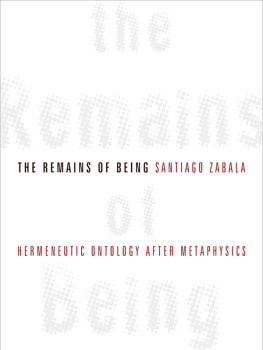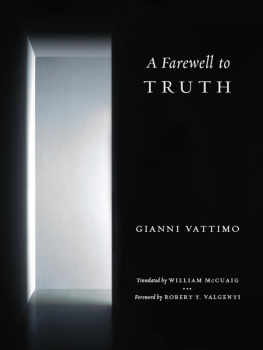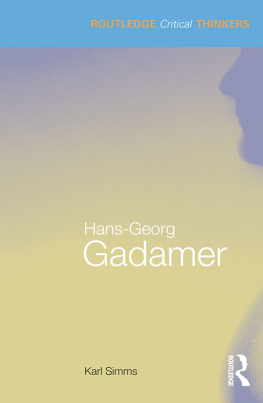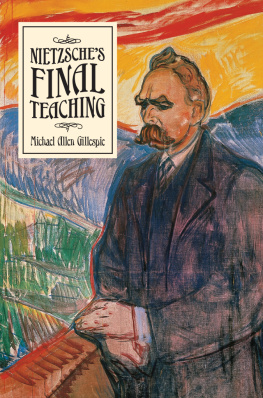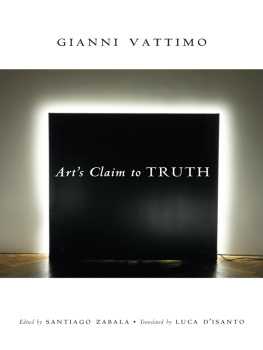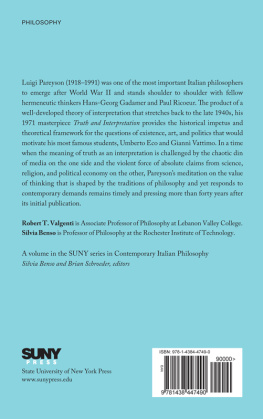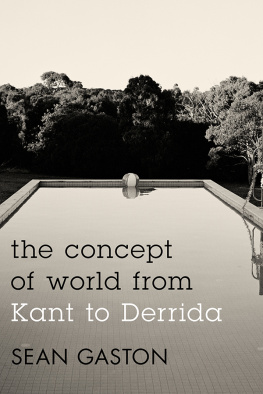THE REMAINS OF BEING
COLUMBIA UNIVERSITY PRESS
PUBLISHERS SINCE 1893
NEW YORK CHICHESTER, WEST SUSSEX
cup.columbia.edu
Copyright 2009 Columbia University Press
All rights reserved
E-ISBN 978-0-231-52004-1
Library of Congress Cataloging-in-Publication Data
Zabala, Santiago, 1975
The remains of being : hermeneutic ontology after metaphysics / Santiago Zabala.
p. cm.
Includes bibliographical references and index.
ISBN 978-0-231-14830-6 (cloth : alk. paper)ISBN 978-0-231-52004-1 (e-book)
18891976. I. Title.
BD311.Z33 2009
111dc22
2008053629
A Columbia University Press E-book.
CUP would be pleased to hear about your reading experience with this e-book at .
FOR CARMELO DOTOLO, ANA MESSUTI, AND GIANNI VATTIMO
The distinction between the Being of existing Dasein and the being of beings unlike Dasein (for example, reality) may seem to be illuminating, but it is only the point of departure for the ontological problematic; it is not something with which philosophy can rest and be satisfied.
MARTIN HEIDEGGER, BEING AND TIME (1927)
What now is stands in the shadow of the destiny of oblivion of Being that already preceded it. The difference between being and the Being, however, can be experienced as something forgotten only if it is unveiled along with the presencing of what is present; only if it has left a trace, which remains preserved in the language, to which Being comes. Thinking along these lines, we may surmise that the difference has shown up more in the earlier than in the later word of Beingthough never having been named as such. Illumination of the difference, therefore, cannot mean that the difference appears as the difference. On the contrary, it may be that the relation to what is present announces itself in the presencing as such, in such a way, indeed, that presencing comes to speak as this relation.
MARTIN HEIDEGGER, OFF THE BEATEN TRACK (1950)
Our thinking, or better expressed, our reckoning and accounting according to the principle of noncontradiction, can hardly wait to offer the observation that a history which is, but in which there is nothing to Being itself, presents us with an absolute absurdity. But perhaps Being itself does not trouble itself about the contradictions of our thought. If Being itself had to be what it is by grace of a lack of contradiction in human thought, then it would be denied in its own proper essence. Absurdity is impotent against Being itself, and therefore also against what happens to it in its destinythat within metaphysics there is nothing to Being as such.
MARTIN HEIDEGGER, NIETZSCHE (1961)
THE THESIS OF THIS BOOK IS THAT PHILOSOPHY SINCE Plato has not only been a forgetfulness of Being, as Martin Heidegger explained in Being and Time, but an expression of Beings remnants, that is, the remains of Being. If Parmenides, Heidegger, and Lvinas suggested that to on, es gibt Sein, and il y a de ltre, it is because Being is an event, a kind of initial generosity and gift through which philosophy began. As soon as I started my study of philosophy, reading Plato, Augustine, Nietzsche, Dewey, Pareyson, Davidson, and others, I became obsessed and astonished by metaphysics, because it investigates questions that science does not address and answers that which it presupposes. There is a universal and totally determinant attribute to things, which is existence, and to be incessantly astonished, philomuthos, by this existence is what has set philosophy, philosophos, on the way toward the question of what it is that is, of what it is that constitutes Beingness in opposition to beings, thinking to calculation. Calculation is the domain of ontic sciences such as nuclear physics, which concentrates on forces, reactions, and internal structures of the atomic nuclei. Thinking instead belongs to the domain of ontology, thus of philosophy, which does not concentrate on a being such as an atomic nuclei but in thinking the Being of it, in order to experience how it is that existence manifests itself in the atomic nuclei. In doing so, philosophy does not devalue the substantive world as Cartesian subjectivity, Kantian transcendence, or Nietzschean voluntarism did; on the contrary, it immerses itself in the full thereness of things.
There is no scientific investigation without an explicit or implicit ontology. This is the question of ontology, the question of Being, the Seinsfrage, which since Anaximander, Heraclitus, and Parmenides has determined the nature of philosophy and men. This question is also the question as to the purpose, the sense, and the meaning of human life, values, and principles. It is our practical moral life that makes man ask this question. Although this problem has been forgotten for several centuries, it returned to life thanks to Heideggers efforts at the beginning of the twentieth century. This problem was first characterized as ontology by Christian Wolf, after the publication of his Ontology in 1729, and, ever since, ontology has been a synonym for metaphysics. When I was taught that this was and will always be the most genuine and central problem of philosophy, what I found most fascinating is not that most philosophers have investigated it but that all the other problems presuppose it, because it remains. That is, all those philosophers and philosophies that have not explicitly investigated this problem presuppose an understanding and remnant of Being that also determines and conditions their work. Each epoch in the history of philosophy can be alluded to in the name that a major philosopher of the period has given to the Being of entities in his research: idea in Plato, energeia in Aristotle, act in Aquinas, representedness in Descartes, objectivity in Kant, absolute Spirit in Hegel, lan vital in Bergson, will to power in Nietzsche, conversation in Gadamer, trace in Derrida, and so on. Since the question of Being implies a continuity without which there is not anything, and since as philosophers we are part of the linguistic tradition that has always investigated this question, we are obliged to pursue it.
All this induced me to take seriously Heideggers philosophy and, most of all, the consequences of the destruction of Being as presence or the overcoming of metaphysics that he put forward both to retrieve Being from its forgetfulness and because this Being did not apply to the particular human mode of being. My teacher, either to calm or motivate my worries concerning this obsession, used to say that to remain a philosopher means to be obsessed around the verb Being (concerning what is and what is not) because it invites you not to remain satisfied with ones own identity and to seek the entire horizon of Beingin other words, to dialogue. Although he kept assuring me I was not alone in this obsession of philosophers with the problem of Being, he showed me how few have analyzed the consequences of this deconstruction put forward for the first time by Heidegger in terms of remnants. I decided to investigate this problem not for sociological reasons or to put forward an effective history, a Wirkungsgeschichte of Being, but because the same philosophers who took seriously the consequences of this deconstruction were also observing, as Heidegger put it, that there is nothing to Being as such (having been deconstructed), that Being is the most worn-out (having been interpreted), and that Being has left a trace (being generational). Now, this weak or limited status of Being is not a negative aspect of it, as if its days have ended, but, on the contrary, another beginning: retrieving and destroying Being as presence has opened the way to overcome metaphysics through its remains, which are unpresentable.
Metaphysics began with Plato and ended with Nietzsche because, thanks to this destruction, we have overcome the interpretation of Being as an object that caused conceptual limitations through such polarities as presence versus absence, Being versus nothingness, truth versus error, mind versus matter, soul versus body, or man versus woman. But metaphysics cannot be abandoned, because it constitutes our understanding of Being, which we cannot escape, since it is part of what has shaped our tradition, humanity, and destiny. This is why contemporary philosophers speak of our epoch as postmetaphysical: we are now finally aware that metaphysics is not something rigid and determining, because we have the ability to take it up consciously as our own, to shape what we see it to have been, where it will take us in the future, and even what it will become.
Next page
